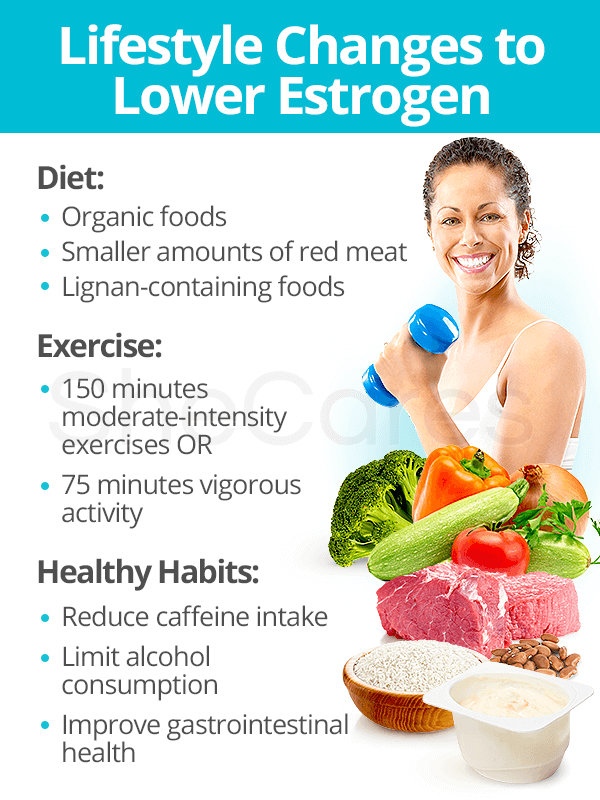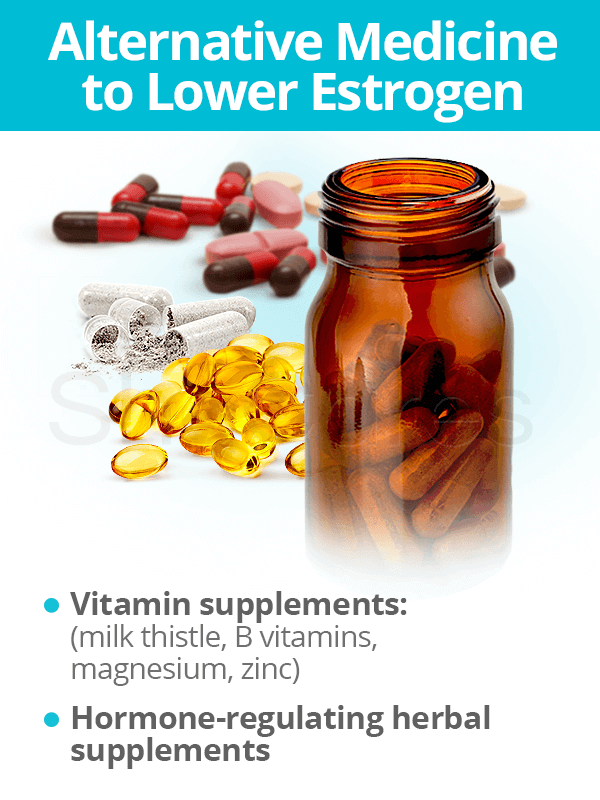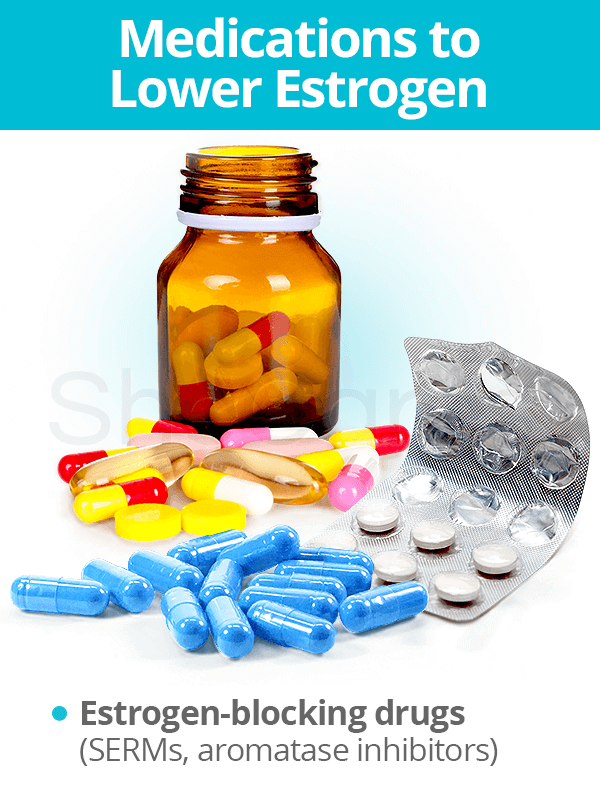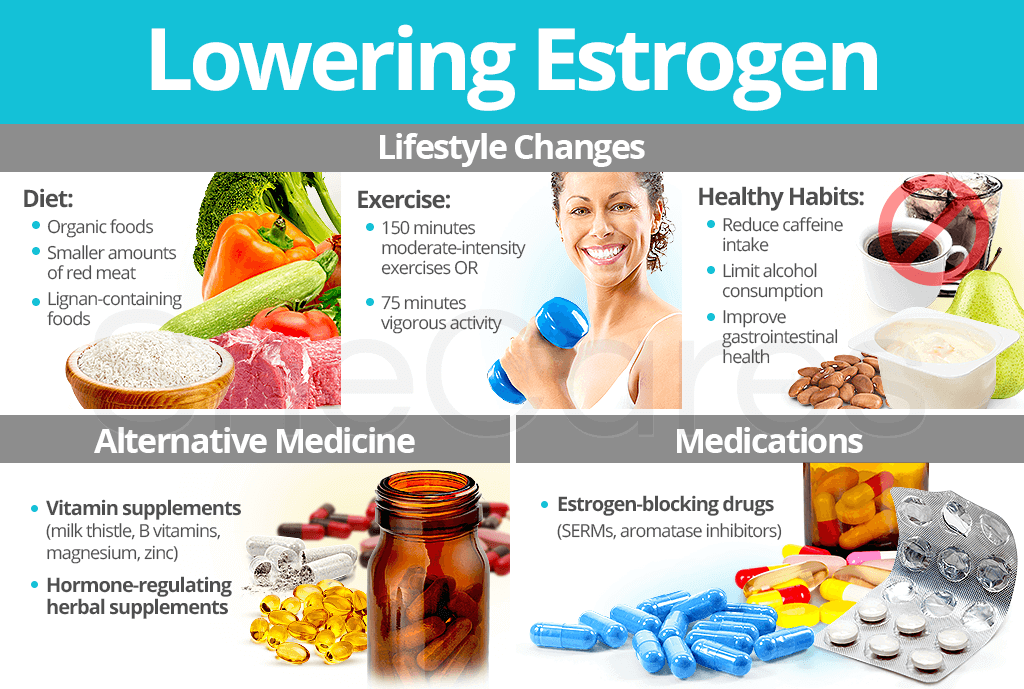When an estrogen imbalance is diagnosed, it is important to follow through with treatment straight away before symptoms worsen into serious health concerns.
Continue reading to find out more about how to lower estrogen levels naturally and finally alleviate hormonal imbalance symptoms.
Lifestyle Changes to Lower Estrogen

An adjustment in diet, exercise, and habits can dramatically improve endocrine system functions, balancing estrogen levels and improving overall health.
Diet
General healthy eating involves consuming a wholesome diet of unprocessed foods that contain a myriad of necessary essential nutrients. Women should aim to consume:
- Organic foods. Nonorganic foods contain pesticides, herbicides, and other pest and weed controllers that contain xenoestrogens, which can raise estrogen levels by mimicking the effects of true estrogen. Consumption of organic products will reduce incidental xenoestrogen absorption.
- Green tea. Among postmenopausal women, green tea consumption is associated with reduced estrogen levels in the body. This may be result of green tea's polyphenols inhibiting aromatase, which is an instrumental enzyme in converting androgens to estrogens.
- Smaller amounts of red meat. Conventional red meats are notoriously high in hormone-disrupting chemicals. Moreover, research has found that high-fat diets - including the saturated fats found in red meat - promote the production of estrogen.
- Lignan-containing foods. Many whole grains and cruciferous vegetables contain polyphenols known as lignans. Even though this group of phytoestrogens is acclaimed to raise estrogen levels, research proves that lignans can also block estrogenic activity in cells to ultimately reduce estrogen levels in the blood. So, it can be said that consumption of lignan-containing foods - like broccoli, cauliflower, kale, flaxseed, rye, buckwheat, millet, oats, barley, corn, rice, and wheat - helps lower estrogen naturally.
Exercise
Excess fat in obese or overweight women promotes higher amounts of circulating estrogens. To maintain a healthy weight and lifestyle, the American Cancer Society recommends adults get at least 150 minutes of moderate intensity or 75 minutes of vigorous activity each week. Weight-bearing and strength-training exercises are great ways to burn off excess estrogens. Some examples are weight training, walking, jogging, and dancing.
Healthy habits
Maintaining healthy habits is essential in trying to decrease estrogen levels naturally.
- Limit alcohol intake. Research points to an alcohol-induced rise in estrogen levels in pre- and post-menopausal women.
- Reduce caffeine. Consumption of at least 200 milligrams of caffeine from coffee can elevate estrogen levels depending upon one's race. Consumption of more than one daily cup of caffeinated soda was associated with higher estrogen levels in all ethnicities tested: Asians, whites, and blacks.
- Improve gastrointestinal health. Estrogen is metabolized by the liver, which converts excess into estrogen metabolites that are subsequently excreted from the body. Therefore, poor gastrointestinal health can obstruct excretion and encourage estrogen reabsorption. Consume adequate amounts of fiber and probiotics to support good bacteria.
All of these lifestyle changes may have a positive effect on balancing hormones holistically. However, they do not directly decrease estrogen levels like some alternative medicines do.
Alternative Medicine to Lower Estrogen

Lowering estrogen levels naturally can be accomplished efficiently with little risk using alternative methods. Three common alternative medicine options are phytoestrogenic herbal supplements, vitamin supplements, and hormone-regulating herbal supplements.
Vitamin supplements
There are a variety of essential nutrients women can take to help metabolize and detoxify excess estrogens in the body quicker, subsequently lowering estrogen levels. These vitamins and minerals include milk thistle, zinc, B vitamins, magnesium, selenium, calcium, vitamin E, and more.
Medications to Lower Estrogen

Intervening with pharmaceutical options often involves higher costs and risks, but in severe cases, they might be the only option.
Estrogen-blocking drugs
Pharmaceutical estrogen blockers are drugs made to be selective receptor modulators (SERMs) or aromatase inhibitors. SERMs bind to estrogen receptors, preventing endogenous estrogen from binding.
In general, SERMs block estrogen activity and serve as estrogen antagonists in some tissues, but they also mimic estrogen effects to serve as estrogen agonists in others. Some more popular estrogen blockers include tamoxifen, anastrozole, letrozole, and exemestane.
If high estrogen levels persist for a longer duration of time, a state of estrogen dominance may develop. Continue reading to discover more about this permanent state of high estrogen levels and the havoc it can wreak for a woman's mental and physical health.
Sources
- American Cancer Society. (2016). Exercise Linked With Lower risk of 13 Types of Cancer. Retrieved September 4, 2017, from https://www.cancer.org/latest-news/exercise-linked-with-lower-risk-of-13-types-of-cancer.html
- Balunas, M.J. et al. (2008). Natural Products as Aromatase Inhibitors. Anti-Cancer Agents in Medicinal Chemistry, 8(6), 646-682. Retrieved September 5, 2017, from https://www.ncbi.nlm.nih.gov/pmc/articles/PMC3074486/
- Dai, Q. et al. (2010). Is Green Tea Drinking Associated With a Later Onset of Breast Cancer? Annals of Epidemiology, 20(1), 74-81. doi: 10.1016/j.annepidem.2009.09.005
- Fibroid Relief. (2010). Reduce Estrogen with a Few Simple Changes. Retrieved September 1, 2017, from http://www.fibroidrelief.org/2010/11/reduce-estrogen-with-a-few-simple-changes/
- Gill, J. (2000). The Effects of Moderate Alcohol Consumption on Female Hormone Levels and Reproductive Function. Alcohol and Alcoholism, 35(5), 417-423. doi: 10.1093/alcalc/35.5.417
- National Institutes of Health. (2012). NIH Study shows caffeine consumption linked to estrogen changes. Retrieved September 4, 2017, from https://www.nih.gov/news-events/news-releases/nih-study-shows-caffeine-consumption-linked-estrogen-changes
- Oregon State University. (2010). Lignans. Retrieved June 1, 2018, from http://lpi.oregonstate.edu/mic/dietary-factors/phytochemicals/lignans
- Page, L. (2008). Health Healing's Detoxification: Programs to Cleanse, Purify & Renew. Minnesota: Healthy Healing Enterprises, LLC. Available from Google Books.
- Weatherby, D. (2004). Signs and Symptoms Analysis from a Functional Perspective: 2nd Edition. USA: Bear Mountain Publishing. Available from Google Books.
- Whitney, E.N. & Rolfes, S.R. (2016). Understanding Nutrition: Fourteenth Edition. Connecticut: Cengage Learning. Available from Google Books.
